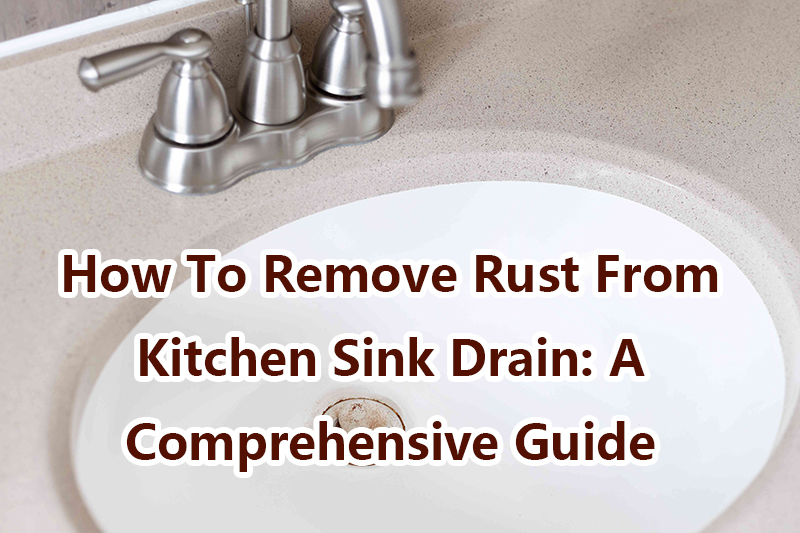
Rust is a common problem in many households, especially in areas with high humidity or hard water. Over time, rust can build up around your kitchen sink drain, causing unsightly stains and potentially damaging your sink. Fortunately, removing rust from your kitchen sink drain is a relatively simple task that you can do yourself with the right tools and techniques. This guide will walk you through the steps to remove rust from kitchen sink drain and restore your sink to its original shine.
Understanding Rust Formation
Before diving into the removal process, it’s important to understand how rust forms. Rust is a type of corrosion that occurs when iron or steel reacts with oxygen and moisture. Kitchen sinks are particularly susceptible to rust because they are frequently exposed to water and food particles, which can accelerate the corrosion process.
Tools and Materials Needed
To effectively remove rust from your kitchen sink drain, gather the following tools and materials:
- White vinegar or lemon juice: Both are acidic and can dissolve rust.
- Baking soda: Acts as a mild abrasive to help scrub away rust.
- Steel wool or a scrub brush: For scrubbing the rust off.
- Old toothbrush: Useful for scrubbing tight areas.
- Soft cloths or paper towels: For cleaning and drying the area.
- Rubber gloves: To protect your hands from harsh chemicals and abrasive materials.
- Commercial rust remover: Optional, but can be more effective for stubborn rust stains.
Step-by-Step Guide to Removing Rust
Step 1: Prepare the Area
Start by cleaning the sink thoroughly. Remove any dishes, food particles, and other debris from the sink. Rinse the sink with warm water and wipe it down with a clean cloth. This will ensure that you are working on a clean surface and can see all the rust spots clearly.
Step 2: Apply an Acidic Solution
Choose either white vinegar or lemon juice, as both are effective at dissolving rust. If using white vinegar, pour it directly onto the rust stains. For lemon juice, cut a lemon in half and squeeze the juice over the rusty areas. Allow the acidic solution to sit on the rust stains for at least 30 minutes. The acid will break down the rust, making it easier to remove.
Step 3: Scrub the Rust
After the acidic solution has had time to work, sprinkle baking soda over the rust stains. The baking soda will react with the acid, creating a fizzy reaction that helps lift the rust. Use a piece of steel wool or a scrub brush to scrub the rust spots gently. Be careful not to scrub too hard, as you could scratch the sink’s surface. For tight areas around the drain, use an old toothbrush to scrub the rust.
Step 4: Rinse and Dry
Once you have scrubbed away the rust, rinse the sink thoroughly with warm water to remove any residue. Use a soft cloth or paper towels to dry the sink completely. This step is crucial because leaving water on the surface can cause new rust to form.
Step 5: Use a Commercial Rust Remover (Optional)
If the rust stains are particularly stubborn and do not come off with vinegar or lemon juice, you may need to use a commercial rust remover. Follow the instructions on the product label carefully. Typically, you will apply the rust remover to the stains, let it sit for the recommended time, and then scrub and rinse as usual. Always wear rubber gloves and ensure good ventilation when using chemical cleaners.
Preventing Rust in the Future
After successfully removing the rust from your kitchen sink drain, take steps to prevent it from returning:
- Keep the sink dry: Wipe down the sink with a dry cloth after each use to prevent water from sitting on the surface.
- Use a sink mat: A sink mat can protect the surface of your sink from scratches and reduce the risk of rust formation.
- Apply a protective coating: There are various products available that can create a protective barrier on the surface of your sink, helping to prevent rust.
- Avoid harsh chemicals: Some cleaning products can damage the finish on your sink, making it more prone to rust. Use gentle, non-abrasive cleaners whenever possible.
- Fix leaks promptly: Any leaks around your sink or faucet should be fixed immediately to prevent water from accumulating and causing rust.
Conclusion
Removing rust from your kitchen sink drain is a manageable task that can greatly improve the appearance and longevity of your sink. By using common household items like vinegar, lemon juice, and baking soda, you can effectively dissolve and scrub away rust stains. For tougher stains, commercial rust removers are available. Remember to take preventative measures to keep your sink dry and protected from future rust formation. With a little effort, you can keep your kitchen sink looking clean and rust-free for years to come.
 ARCORA FAUCETS
ARCORA FAUCETS